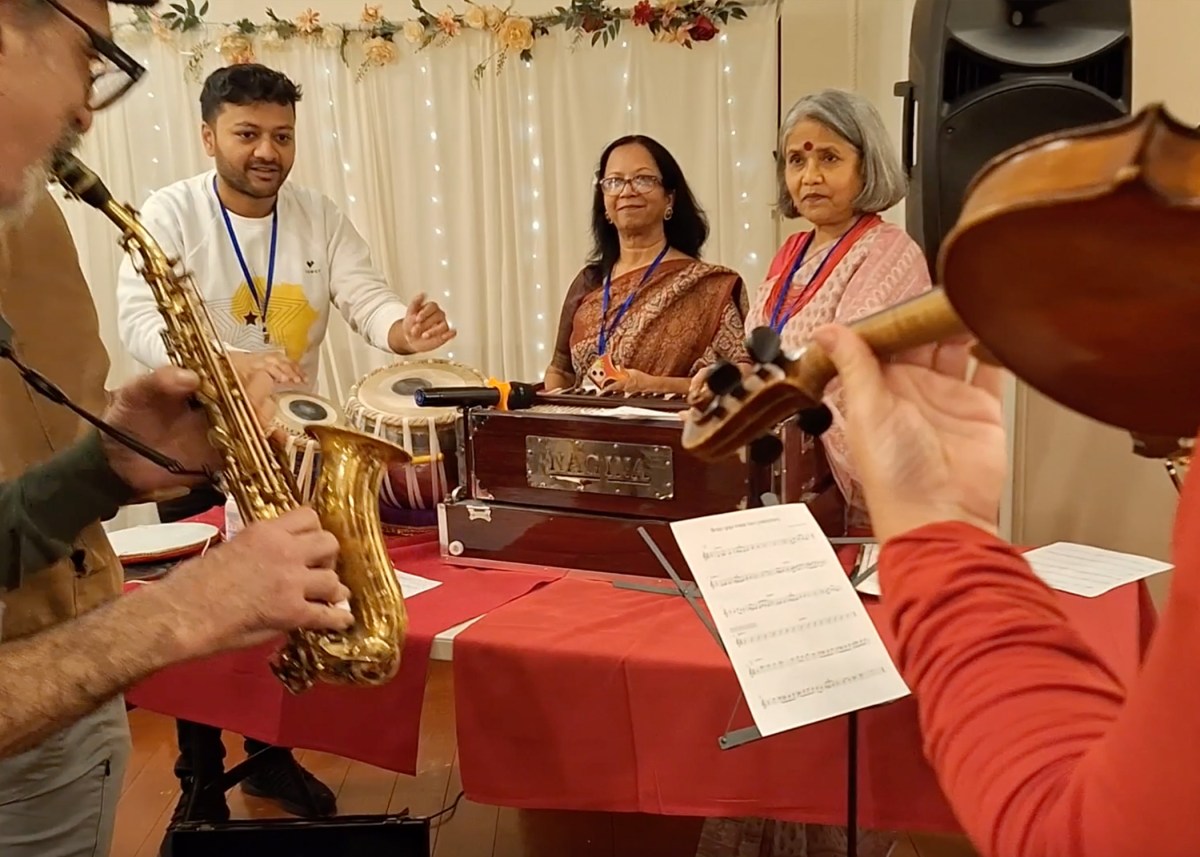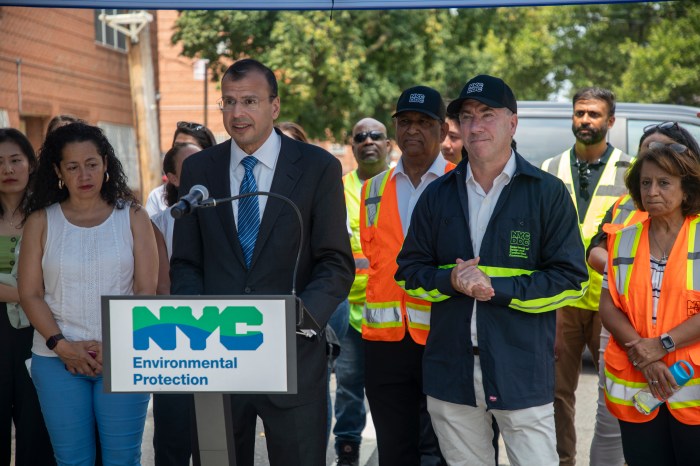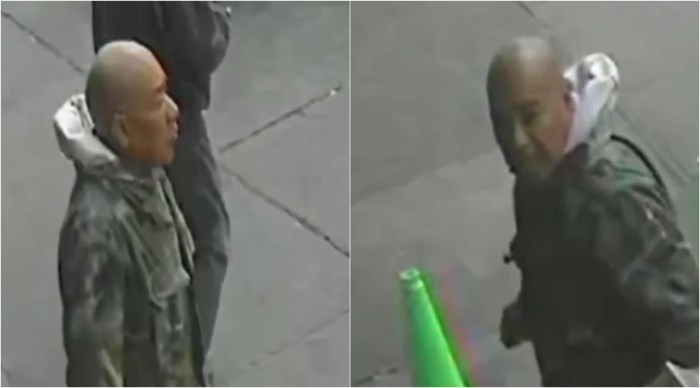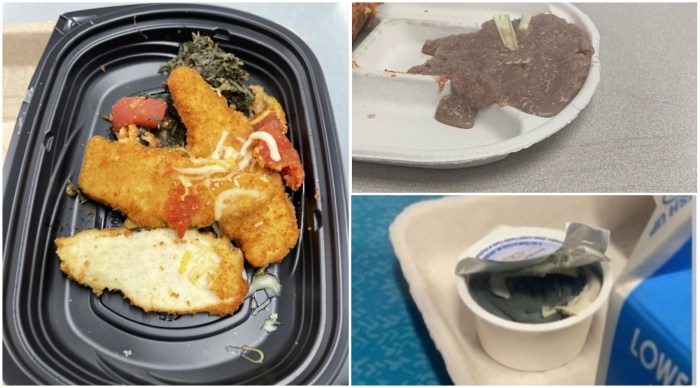After an Indian buffet, warm chai and a vent about the difficulty of finding space for jamming sessions, 18 Jewish and Muslim musicians in Kensington opened up their instrument cases.
The musicians formed a tight circle inside Jalsa, a small local restaurant, turning it into an impromptu jamming space. Soon enough, the tabla gave beats to the saxophone and oud’s soulful melodies, while the harmonium and violin wove in their resonant chords. Other instruments joined in, creating a distinctive intercultural experience.
Kensington, a diverse neighborhood with long-standing and adjacent South Asian Muslim and Jewish communities, was home to this unique gathering at Jalsa on a cloudy December afternoon. Set against the backdrop of increasing violence in the Palestine-Israel conflict, a dispute between predominantly Muslim and Jewish communities, the lunch brought together musicians of the two faiths to discuss and create music. Community organizers aim to make this a precursor to upcoming gatherings that unite the neighborhood in 2024.
“Music transcends language barriers,” said Jill Reiner, founder of Singing Winds, a multi-lingual storytelling program in Kensington, who attended the lunch. “And there are so many common roots. If you listen to Israeli and Arabic music, there are even similar beats!”
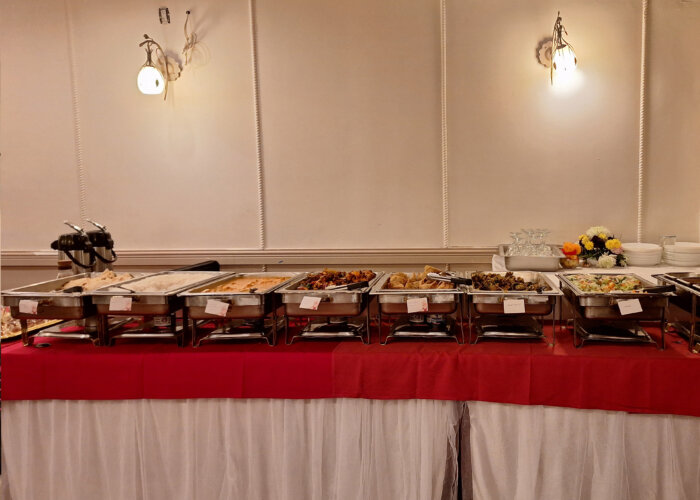
Sponsored by Arts & Democracy and Naturally Occurring Cultural Districts NY (NOCD-NY), two non-profits deeply ingrained in the community organizing and local arts scene, the lunch event on Dec. 2 was organized prior to the escalation in the Palestine-Israel conflict and did not explicitly address it. However, the gathering unfolded within a neighborhood that boasts a decade-long history of interfaith organizing.
“We [Arts and Democracy], along with other people at the lunch, have worked many years in these communities to build relationships so there was trust in the room,” said Caron Atlas, director of Arts and Democracy. “In 2024, we are planning for a series of neighborhood dinners which will bring diverse people together.”
A history of interfaith gatherings
Brooklyn holds a history of unity between its Jewish and Muslim communities, evident in various occasions throughout the years. In 2019, amid a surge in antisemitic incidents across the city, JFREJ (Jews for Racial and Economic Justice) organized a gathering in Grand Army Plaza, led by Muslims to show support for their Jewish neighbors. During heightened Islamophobia in Donald Trump’s presidency, Arts & Democracy orchestrated a “Meet Your Neighbors” event. This gathering featured music performances by Muslim, Jewish, and Hispanic communities, attracting over 100 participants.
In the aftermath of 9/11, community organizers conducted an interfaith walk for 15 years called the “Children of Abraham Peace Walk,” an annual procession of 250 to 300 Jews, Muslims and Christians traveling a route that consistently included visits to a synagogue, mosque, and church.
At the end of last month, owners of Palestinian restaurant Ayat in Ditmas Park, organized a Shabbat dinner in an effort to spark dialogue and forge ties with the local Jewish community.
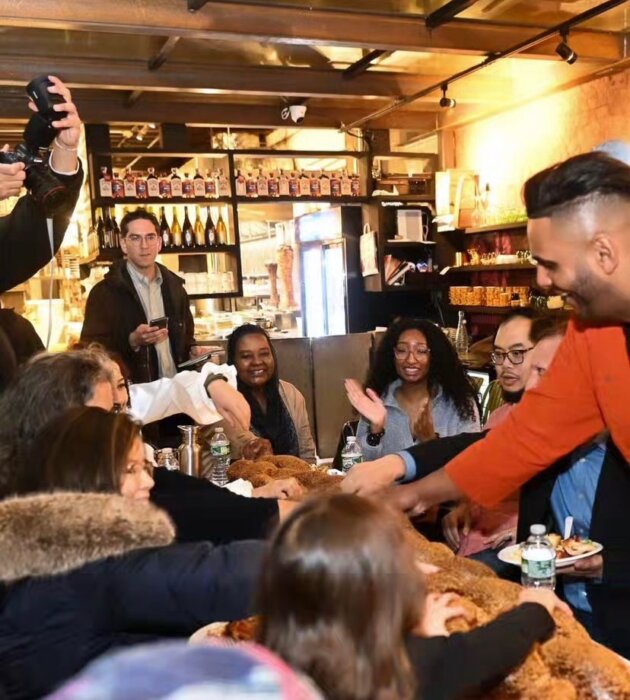
And in recent years, the community Iftar held in spring during Ramadan has become a prominent event. Arts and Democracy, alongside local organizers, orchestrates this gathering in Avenue C Plaza in Kensington. Muslim women lead the performances, while congregations from local Jewish synagogues help with the arrangement and management of the event.
Ellen Lippmann, a leader in the Reformed Jewish community and a primary organizer of the Children of Abraham Peace Walk, believes there is no single path to increasing connection during these times.
“Music speaks a language different from talking, certainly different from yelling,” said Lippmann, a former rabbi at Kolot Chayeinu, a Jewish congregation in Park Slope and longtime Kensington resident. “Sometimes it’s okay to let things rest and build relationships first.”
Neighboring communities
While the center of the South Asian Muslim community in Kensington is the intersection of Church and McDonald Avenues, adjacent Borough Park is home to a large Orthodox Jewish community. A reformed Jewish community resides in pockets near Newkirk Plaza, Windsor Terrace and other parts of Kensington.
As a seasoned community organizer and coordinator at the local elementary school, Reiner has observed inter-community dynamics over the years. She believes that Kensington’s diversity helps keep the power dynamics in check. The residents share a desire to not ruffle feathers or draw undue attention that could create backlash, she said.
“There isn’t much interaction between the two communities.” said Reiner, “But I believe the Muslim community is very interested in how the Hasidim (Orthodox Jews) in Borough Park have created a separate community with political power and respect. And the Jewish community has a lot of respect for religious communities like the conservative Muslims in Kensington. There is respect based on shared fundamental values – scripture, religion, prayer, tradition, non-assimilation to the West, gender roles, family roles.”
“There is a lot of grappling with realities,” said Yoshie Fruchter, co-host of the December lunch and a musician associated with the Flatbush Jewish Center. “Because in one sense [the conflict] is not taking place here, but it sort of makes its way here. The fact that we are here in the city means we have the advantage of having conversations that are not tied down in the same way as someone in the same geographical location would have.”
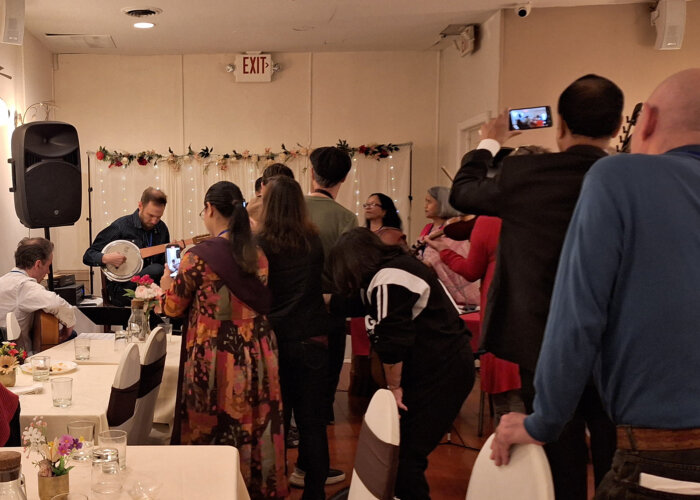
The other co-host of the lunch, Annie Ferdous, founder of the Bangladesh Institute of Performing Arts, believes that while a city like New York helps create dialogue, it tends to amplify certain voices over others.
“Sometimes the Bangladeshi Muslims are heard less,” Ferdous said. “There are language barriers in English so we can’t express more, do more. But music can help with that.”
Community organizing: What lies ahead
The escalating conflict in the Middle East has extended beyond Israel and Gaza, carrying global implications. Aamnah Khan, a community organizer with the non-profit Desis Rises Up and Moving, urges a deeper reflection of the role of art and music in the face of the intensifying warfare and violence.
“Even with the musicians’ lunch, we need to think of what it means,” said Khan, a lifelong Kensington resident. “It’s almost like this elephant in the room. I think art can be a tool for transformation and I don’t think we are doing a service by tippy-toeing around the edges of what we need to confront.”
An example of a more long-term project of local inter-faith community organizing is the 5 p.m. Porch Series started by Roy Nathanson, a musician dedicated to participatory music and community building. Amid the pandemic, Nathanson played his saxophone on his porch at Newkirk Plaza, eventually leading to a collaborative porch concert series involving musicians from Palestinian, Pakistani, Caribbean and Jewish backgrounds. This series evolved into a free music school, now attended by 45 children from low-income families in the neighborhood.
“Kensington is so diverse, it is heaven on Earth,” Nathanson said. “These 45 kids means 45 families not just showing culture to each other, but creating it together through music.”
Buoyed by a sense of optimism, community members who participated in the lunch envision making deeper connections in the neighborhood as they embark on planning for 2024.
Initiatives led by Arts and Democracy, in collaboration with Lippmann, include a series of planned dinners designed to unite Kensington’s communities. Preparations also are underway for the annual Kensington Community Iftar in early April, spotlighting Muslim women activists and artists, with support from volunteers representing Kolot Chayeinu and other synagogues.
“More points of connection makes you realize that everyone’s a human being,” said Atlas. “It’s hard to have hate crimes when people have that response to each other.”


